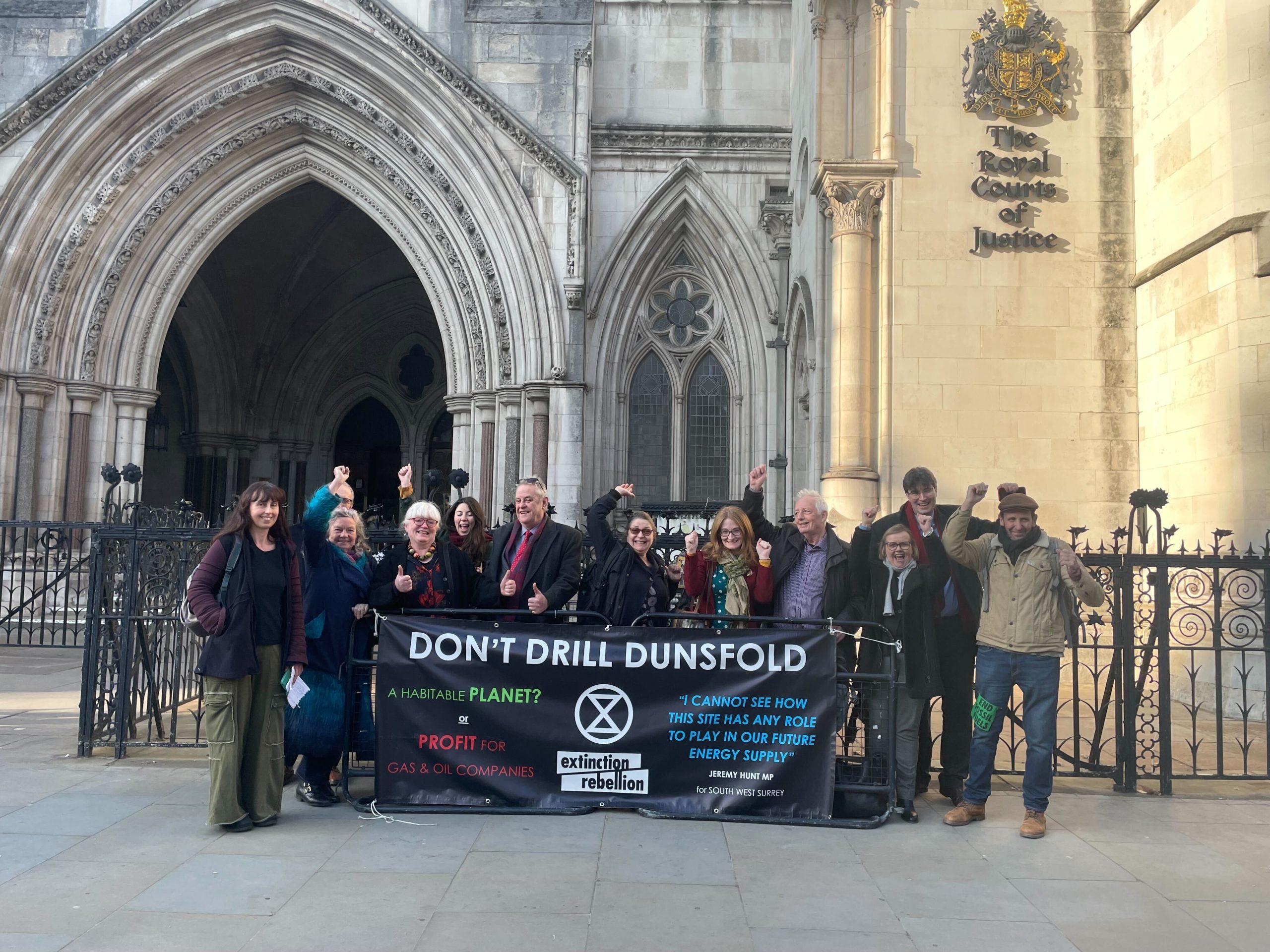

A scheme to allow a drilling project on the edge of an Area of Outstanding Natural Beauty (AONB) in Surrey is being challenged in the High Court (Royal Courts of Justice) this Thursday (8th June). Good Law Project is supporting the action being brought by the local council and campaign group, Protect Dunsfold, against the Government which gave the project the green light.
The energy company, UK Oil and Gas (UKOG), was given the go ahead to carry out drilling operations on the Dunsfold site by the Department of Levelling Up, Housing and Communities in June 2022.
This decision was made despite two previous planning refusals by Surrey County Council. The Chancellor, Jeremy Hunt, the local MP, was against the project at the time and spoke out against the Government’s intervention.
Back in March, the High Court gave permission to the claimants, Protect Dunsfold and Waverley Borough Council, to move forward with a judicial review of the Government’s decision.
The claimants will present two legal arguments to the High Court. The first relates to inconsistency in decision-making by the Secretary of State, who gave the Dunsfold drilling site the go-ahead on the same day that he refused permission for a comparable site in Ellesmere Port.
For that project, greenhouse gas emissions were cited as the most significant factor for refusing permission in Ellesmere Port, with the Secretary of State stating that ‘every tonne of carbon contributes to climate change’. When it came to Dunsfold, the Secretary of State reached a different decision.
The second argument relates to the site being on the edge of Surrey Hills, an Area of Outstanding Natural Beauty. National policy requires planning decisions to give great weight to “conserving and enhancing landscape and scenic beauty” in AONBs.
The Government failed to take this requirement as its starting point, as it should have done, explained a press release from the Good Law Project.
The outcome of the hearing could have significant implications for future on-shore fossil fuel projects going through the planning permission process.
On the day, campaign groups and activists from across Surrey and the Southeast are expected to gather outside of the Royal Courts of Justice in a show of support.
The decision will be reserved.
Legal Manager at Good Law Project, Jennine Walker, said:
“Exploiting our natural landscape for fossil fuels is simply not an option given the climate emergency we are facing today. It’s a scandal that the Government ran roughshod over Surrey County Council to give the scheme the green light. Even the local MP, and now Chancellor, Jeremy Hunt has spoken out against the decision.
“UKOG’s plans to drill the Dunsfold site will see irreparable harm to the natural habitats and landscape on the edge of the Surrey Hills Area of Outstanding Natural Beauty, as well as producing significant amounts of greenhouse gas emissions.
“We hope that success in the High Court will put a stop to this and also make it more difficult for similar schemes to gain approval in the future. This High Court challenge is not only a must-win for the Dunsfold community; the UK’s vital efforts to tackle the climate emergency also hang in the balance.”
Sarah Godwin, Director at Protect Dunsfold, said:
“Protect Dunsfold are hopeful of a positive outcome to the hearing on June 8th, so that the decision to allow UKOG 234 Ltd to carry out exploratory drilling in Loxley/Dunsfold could be reversed by the Minister of State.
“This might be just one small exploratory drilling project, but it is one too many. UKOG’s plans would have a considerable negative impact on the natural environment around Dunsfold and beyond. If this project is prevented from even starting it will be a significant step forward in real meaningful action to stop runaway climate chaos”.
Leigh Day solicitor, Ricardo Gama, said:
“The Secretary of State conceded in the Ellesmere Port decision that ‘every tonne of carbon contributes to climate change’, but ignored this fact when granting planning permission for the Dunsfold exploratory well, even though he decided both appeals on the very same day.
“This flies in the face not only of the principle of consistency in the planning system, but also of the urgent need to head off climate disaster. Our clients hope that the court will recognise the perversity of this situation and order the Government to reconsider.”
- SEO Powered Content & PR Distribution. Get Amplified Today.
- PlatoAiStream. Web3 Data Intelligence. Knowledge Amplified. Access Here.
- Minting the Future w Adryenn Ashley. Access Here.
- Buy and Sell Shares in PRE-IPO Companies with PREIPO®. Access Here.
- Source: https://envirotecmagazine.com/2023/06/06/fossil-fuel-drilling-scheme-faces-high-court-challenge/
- :has
- :is
- :not
- $UP
- 2022
- 8th
- a
- across
- Action
- activists
- After
- against
- ahead
- allow
- also
- amounts
- an
- and
- appeals
- approval
- ARE
- AREA
- argument
- arguments
- around
- AS
- At
- Balance
- banners
- BE
- Beauty
- being
- Beyond
- both
- brought
- but
- by
- came
- Campaign
- carbon
- carry
- Celebrating
- challenge
- challenged
- cited
- Claimants
- clients
- Climate
- Communities
- community
- company
- comparable
- considerable
- content
- could
- Council
- county
- Court
- Courts
- day
- decided
- decision
- Decision Making
- decisions
- Department
- Despite
- different
- difficult
- Director
- disabled
- disaster
- done
- Edge
- efforts
- either
- emergency
- Emissions
- energy
- enhancing
- Environment
- Envirotec
- Even
- expected
- explained
- Face
- faces
- facing
- fact
- factor
- Failed
- First
- For
- Forward
- fossil
- Fossil fuel
- fossil fuels
- from
- Fuel
- fuels
- future
- Gain
- GAS
- gather
- Give
- given
- Go
- going
- good
- Government
- granting
- great
- Green
- green light
- greenhouse gas
- Greenhouse gas emissions
- Group
- Group’s
- Hang
- harm
- Have
- he
- head
- hearing
- High
- Hills
- hope
- hopeful
- housing
- HTTPS
- hunt
- if
- image
- Impact
- implications
- in
- intervention
- IT
- ITS
- Jeremy Hunt
- jpg
- judicial
- june
- just
- just one
- Justice
- landscape
- Law
- Legal
- light
- local
- Ltd
- made
- make
- manager
- many
- March
- meaningful
- might
- more
- most
- move
- move forward
- National
- Natural
- Need
- negative
- no
- now
- of
- off
- Oil
- Oil and Gas
- on
- ONE
- only
- Operations
- Option
- or
- order
- our
- out
- Outcome
- outside
- outstanding
- over
- permission
- planning
- plans
- plato
- Plato Data Intelligence
- PlatoData
- Point
- policy
- positive
- present
- press
- Press Release
- previous
- principle
- process
- project
- projects
- protect
- put
- qualified
- reached
- real
- recognise
- reconsider
- refusing
- release
- requirement
- requires
- reserved
- review
- royal
- Said
- same
- Scandal
- scenic
- scheme
- schemes
- Second
- secretary
- see
- should
- show
- significant
- similar
- simply
- site
- situation
- small
- So
- spoken
- Starting
- State
- Step
- Stop
- success
- support
- Supporting
- Surrey
- system
- tackle
- Take
- that
- The
- The Future
- their
- There.
- they
- this
- though?
- Through
- thursday
- time
- to
- today
- too
- two
- Uk
- urgent
- very
- vital
- was
- we
- weight
- WELL
- were
- when
- which
- WHO
- will
- winning
- with
- would
- zephyrnet









